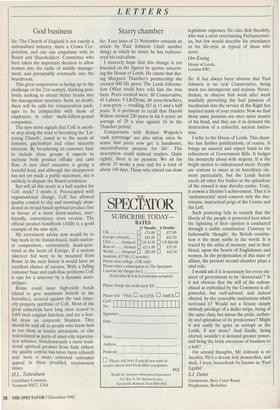LETTERS God business
Sir: The Church of England is not exactly a nationalised industry, more a Crown Cor- poration, and one can empathise with its Board and Shareholders' Committee who have taken the important decision to allow women into the ranks of middle manage- ment, and presumably eventually into the boardroom.
This great corporation is facing up to the challenge of the 21st century, thinking posi- tively, seeking to attract better brains into the management structure. Soon, no doubt, there will be calls for remuneration pack- ages to be comparable with those of employees in other multi-billion-pound companies.
The new move signals that CoE is anoth- er step along the road to becoming the 'Lis- tening Church', tuned in to the needs of feminist, gay/lesbian and other minority interests. By broadening its customer base to include these groups it expects to increase both product offtake and cash flow. A new chief executive is giving a forceful lead, and although the chairperson has not yet made a public statement, she is unlikely to dispute the Board resolution.
But will all this result in a bull market for CoE stock? I doubt it. Preoccupied with organisational change, CoE has allowed quality control to slip and seemingly aban- doned its broad-based spiritual product line in favour of a more down-market, user- friendly, convenience store version. The official product handbook (ASB) is a good example of the new style.
My investment advice now would be to buy stock in the Italian-based, multi-nation- al competition, conveniently head-quar- tered at the heart of Europe. If a serious takeover bid were to be mounted from Rome in the near future it would have an excellent chance of success. With a falling customer base and cash-flow problems CoE is ripe for a takeover by a dynamic asset- stripper.
Rome could issue high-yield bonds (dated to give maximum benefit in the hereafter), secured against the vast inner- city property portfolio of CoE. Most of the great cathedrals have long since ceased to fulfil their original function, and are a fear- ful drain on corporate finances. They should be sold off to people who know how to run them as tourist attractions, or else redeveloped as parts of inner-city rejuvena- tion schemes. Simultaneously a mere tradi- tional spiritual product from Italy (where the quality control has never been relaxed) may have a more universal consumer appeal in these troubled, recessionary times.
H.L. Tottenham
Craftsbury Common, Vermont 05827, USA










































































 Previous page
Previous page